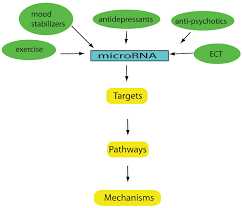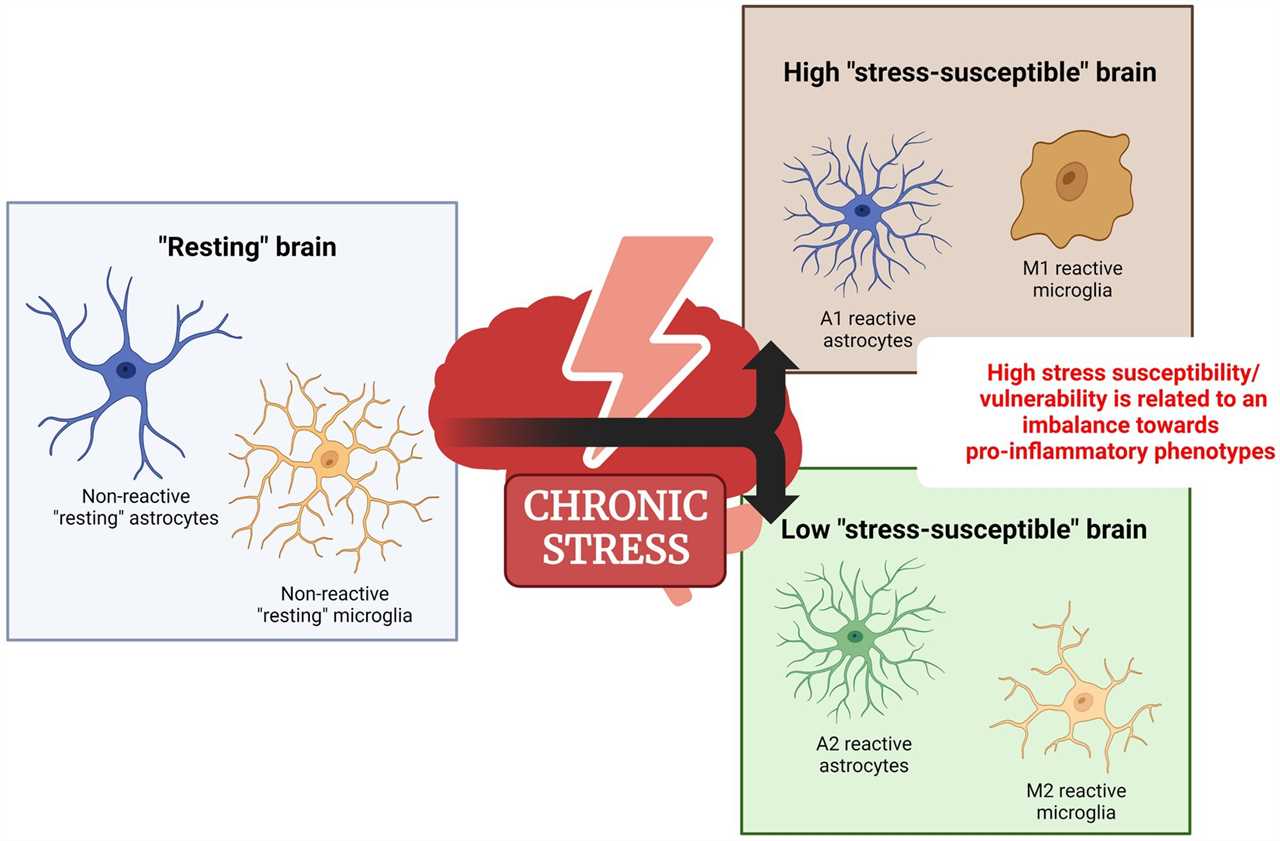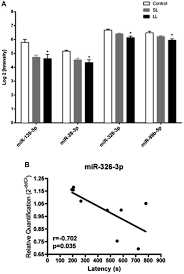
In today’s fast-paced and demanding world, stress has become a common experience for many individuals. While some people seem to handle stress with ease, others may struggle to cope, leading to mental health issues such as anxiety and depression. Understanding the factors that contribute to resilience or vulnerability to stress is crucial for developing effective interventions and treatments.
Recent research has shed light on the role of micrornas as potential biomarkers of resilience or vulnerability to stress. Micrornas are small non-coding RNA molecules that play a crucial role in regulating gene expression. They have been found to be involved in various biological processes, including stress response and adaptation.
Studies have shown that specific micrornas are dysregulated in individuals who are more susceptible to stress and develop mental health disorders. These micrornas may be involved in modulating the activity of genes that regulate stress response pathways in the brain. By studying the expression patterns of these micrornas, researchers can potentially identify individuals who are at a higher risk of developing mental health issues in response to stress.
Furthermore, understanding the role of micrornas in resilience can help identify potential targets for therapeutic interventions. By manipulating the expression of certain micrornas, it may be possible to enhance resilience and improve mental health outcomes in individuals who are vulnerable to stress. This research opens up new avenues for personalized medicine and targeted interventions, paving the way for more effective treatments for stress-related mental health disorders.
Micrornas and their Role in Mental Health
Micrornas (miRNAs) are small non-coding RNA molecules that play a crucial role in gene expression regulation. They have been found to be involved in various biological processes, including cell development, differentiation, and apoptosis. Recent research has shown that miRNAs may also serve as biomarkers for mental health conditions, particularly in relation to resilience and vulnerability to stress.
Resilience is the ability to adapt and cope with stress and adversity, while vulnerability refers to the susceptibility to develop mental health disorders in response to stress. Understanding the molecular mechanisms underlying these processes is crucial for identifying potential therapeutic targets and developing personalized treatment strategies.
Studies have shown that miRNAs can be differentially expressed in individuals with mental health disorders compared to healthy individuals. For example, certain miRNAs have been found to be upregulated in individuals with depression, anxiety, and post-traumatic stress disorder (PTSD). These miRNAs may regulate genes involved in stress response pathways and inflammation, potentially contributing to the development and progression of these disorders.
Furthermore, miRNAs have been implicated in resilience to stress. Some miRNAs have been found to be upregulated in resilient individuals, suggesting that they may play a protective role against the negative effects of stress. On the other hand, certain miRNAs have been associated with vulnerability to stress, as they are downregulated in individuals who are more susceptible to developing mental health disorders.
Overall, miRNAs hold great promise as potential biomarkers for mental health conditions. By identifying specific miRNA profiles associated with resilience or vulnerability to stress, researchers may be able to develop diagnostic tools for early detection and personalized treatment approaches. Additionally, targeting miRNAs and their associated pathways may offer new therapeutic avenues for mental health disorders.
The Importance of Micrornas in Mental Health Research
Micrornas have emerged as a key area of focus in mental health research due to their potential role as biomarkers of resilience or vulnerability to stress. These small non-coding RNA molecules have been found to play a crucial role in regulating gene expression, and recent studies have suggested that they may be involved in the development and progression of mental health disorders.
Resilience, the ability to bounce back from stressful situations, is a trait that is highly valued in mental health research. Understanding the molecular mechanisms underlying resilience can help researchers develop targeted interventions and treatments for individuals who are more vulnerable to stress.
Biomarkers, such as micrornas, are measurable indicators of biological processes or conditions. By studying micrornas, researchers can potentially identify specific patterns or changes that are associated with mental health disorders. These biomarkers can then be used to diagnose and monitor the progression of these disorders, as well as to predict an individual’s response to different treatments.
Stress is a major factor in the development and exacerbation of mental health disorders. Micrornas have been shown to be involved in the regulation of the stress response, and alterations in their expression levels have been observed in individuals with various mental health conditions. By studying micrornas, researchers can gain a deeper understanding of the biological mechanisms underlying stress and its impact on mental health.
In conclusion, micrornas hold great promise as biomarkers of resilience or vulnerability to stress in mental health research. Their role in regulating gene expression and their involvement in the development and progression of mental health disorders make them a valuable area of study. By further investigating micrornas, researchers can potentially develop new diagnostic tools and treatments for individuals with mental health conditions.
Micrornas as Potential Biomarkers for Mental Health Disorders

Micrornas (miRNAs) have emerged as potential biomarkers for mental health disorders, providing valuable insights into the underlying mechanisms of vulnerability and resilience. These small non-coding RNA molecules play a crucial role in post-transcriptional gene regulation, influencing the expression of multiple genes involved in various biological processes.
Studies have shown that specific miRNAs are dysregulated in individuals with mental health disorders, suggesting their potential as diagnostic and prognostic biomarkers. For example, certain miRNAs have been found to be upregulated in patients with depression, while others are downregulated in individuals with anxiety disorders.
Furthermore, miRNAs have been implicated in mediating the effects of stress on mental health. Chronic stress can lead to dysregulation of miRNA expression, which in turn affects the expression of target genes involved in stress response pathways. This dysregulation may contribute to the development of mental health disorders and influence an individual’s vulnerability or resilience to stress.
By studying the expression patterns of miRNAs in individuals with mental health disorders, researchers can potentially identify unique miRNA signatures that can aid in the diagnosis and treatment of these conditions. Additionally, miRNAs may serve as targets for therapeutic interventions, as modulating their expression levels could potentially restore normal gene expression and alleviate symptoms.
In conclusion, miRNAs hold promise as potential biomarkers for mental health disorders, providing valuable insights into the underlying molecular mechanisms of vulnerability and resilience. Further research is needed to validate and refine these miRNA signatures, ultimately leading to improved diagnostic and therapeutic approaches for individuals with mental health disorders.
Understanding the Mechanisms of Micrornas in Mental Health

Stress is a common factor that can greatly impact mental health. It can lead to the development of mental disorders such as anxiety and depression. Understanding the mechanisms behind how stress affects mental health is crucial in developing effective interventions and treatments.
Micrornas are small non-coding RNA molecules that play a significant role in regulating gene expression. They have been found to be involved in various biological processes, including stress response and mental health. Recent studies have shown that micrornas can act as biomarkers of resilience or vulnerability to stress.
By studying the expression levels of specific micrornas in individuals exposed to stress, researchers have been able to identify patterns that can indicate an individual’s susceptibility to mental health disorders. These micrornas can serve as potential biomarkers for early detection and intervention.
Furthermore, understanding the mechanisms of micrornas in mental health can provide insights into the underlying biological pathways involved in stress-related disorders. Micrornas have been found to regulate key genes involved in neuroplasticity, neurotransmitter function, and inflammation, all of which are important factors in mental health.
Identifying the specific micrornas and their target genes involved in stress response can help in the development of targeted therapies for individuals at risk of developing mental health disorders. By modulating the expression of these micrornas, it may be possible to promote resilience and prevent the development of stress-related disorders.
In conclusion, understanding the mechanisms of micrornas in mental health is crucial for identifying biomarkers of vulnerability or resilience to stress. By studying the role of micrornas in stress response and mental health, researchers can gain insights into the underlying biological pathways and develop targeted interventions for individuals at risk of developing mental health disorders.
Micrornas as Biomarkers of Resilience to Stress
Stress is a common and inevitable part of life, affecting individuals in various ways. Some people are able to bounce back and adapt to stressors, while others may experience negative consequences that can lead to mental health disorders. Understanding the factors that contribute to resilience or vulnerability to stress is crucial in order to develop effective interventions and treatments.
Micrornas, small non-coding RNA molecules, have emerged as potential biomarkers for resilience to stress. These molecules play a key role in regulating gene expression and have been implicated in various biological processes, including stress response and adaptation.
Research has shown that certain micrornas are differentially expressed in individuals who exhibit resilience to stress compared to those who are more vulnerable. For example, studies have found that miR-135a-5p and miR-34a-5p are upregulated in resilient individuals, while miR-124-3p and miR-132-3p are downregulated.
These micrornas have been shown to target genes involved in stress response pathways, such as the hypothalamic-pituitary-adrenal (HPA) axis and the amygdala. By modulating the expression of these genes, micrornas may influence an individual’s ability to cope with stress and maintain mental well-being.
Furthermore, recent evidence suggests that micrornas may also be involved in the development of resilience to stress. Animal studies have shown that exposure to early life stress can alter microrna expression patterns, which may contribute to long-term changes in stress reactivity and vulnerability. Understanding these mechanisms could lead to the development of targeted interventions to promote resilience in at-risk individuals.
In conclusion, micrornas hold promise as biomarkers of resilience to stress. Further research is needed to validate these findings and elucidate the underlying mechanisms. By identifying individuals who are more resilient to stress, we can develop personalized interventions and treatments to mitigate the negative impact of stress on mental health.
Micrornas Associated with Resilience to Stress
Stress is a common experience in our daily lives and can have a significant impact on our mental health. While some individuals are able to cope with stress and maintain their mental well-being, others may become vulnerable to developing mental disorders. Understanding the factors that contribute to resilience to stress is crucial in identifying biomarkers that can help predict an individual’s susceptibility to mental health issues.
Micrornas, small non-coding RNA molecules, have emerged as potential biomarkers associated with resilience to stress. These micrornas play a crucial role in regulating gene expression and have been implicated in various biological processes, including stress response and emotional regulation.
Studies have shown that specific micrornas are differentially expressed in individuals who exhibit resilience to stress compared to those who are more vulnerable. For example, microrna-137 has been found to be upregulated in resilient individuals, and its expression is associated with better emotional regulation and cognitive flexibility.
Furthermore, microrna-34a has been shown to be downregulated in resilient individuals, and its reduced expression is associated with increased resilience to stress. This microrna is involved in the regulation of the hypothalamic-pituitary-adrenal axis, which plays a crucial role in the stress response.
Identifying these micrornas associated with resilience to stress can provide valuable insights into the molecular mechanisms underlying individual differences in stress resilience. Additionally, these micrornas could serve as potential biomarkers for predicting an individual’s vulnerability to stress-related mental health disorders.
Further research is needed to validate the role of these micrornas as biomarkers of resilience to stress and to explore their potential therapeutic applications. Understanding the complex interplay between micrornas, stress, and mental health can pave the way for personalized interventions and treatments that target these molecular pathways.
In conclusion, micrornas associated with resilience to stress hold promise as biomarkers for predicting vulnerability to stress-related mental health disorders. Further research in this field can contribute to the development of personalized interventions and therapies that promote mental well-being and resilience in individuals facing stressful situations.
The Role of Micrornas in Resilience Pathways
In recent years, there has been growing interest in understanding the role of micrornas in resilience pathways. Resilience refers to the ability to adapt and bounce back from stress or adversity. It is an important factor in mental health, as individuals with high levels of resilience are better able to cope with the challenges and pressures of life.
Stress is a common experience that can have a significant impact on mental health. It can lead to the development of various mental disorders, such as anxiety and depression. However, not everyone who experiences stress develops these disorders. This has led researchers to investigate the factors that contribute to resilience.
Biomarkers are biological indicators that can be used to measure the presence or severity of a particular condition. In the context of resilience, biomarkers can help identify individuals who are more resilient or vulnerable to stress. Micrornas, a class of small non-coding RNA molecules, have emerged as potential biomarkers for resilience.
Studies have shown that certain micrornas are differentially expressed in individuals with high levels of resilience compared to those with low levels of resilience. These micrornas are involved in various biological processes, including stress response, inflammation, and neuroplasticity.
One particular microrna, miR-34a, has been found to play a crucial role in resilience pathways. It is downregulated in individuals with high levels of resilience, and its expression is associated with reduced stress-induced anxiety and depression-like behaviors in animal models.
Other micrornas, such as miR-135b and miR-146a, have also been implicated in resilience. They are involved in regulating the immune response and inflammation, which are important factors in stress resilience.
Understanding the role of micrornas in resilience pathways can provide valuable insights into the mechanisms underlying resilience. It can help identify potential targets for therapeutic interventions aimed at enhancing resilience and preventing the development of mental disorders.
In conclusion, micrornas have emerged as promising biomarkers of resilience to stress. Further research is needed to fully understand their role in resilience pathways and their potential as therapeutic targets. However, the findings so far suggest that micrornas could be a key to unlocking the secrets of mental health and resilience.

I am Patrina de Silva, a psychologist and mental health blogger in Sri Lanka. After obtaining psychology degrees from the University of Colombo and Monash University, I returned home to work as a counselor while also starting the popular blog “Pressy but Happy” to provide advice on psychological issues. Over the past decade, my empathetic articles have made my blog a leading mental health resource in the country. In addition to writing, I maintain a private therapy practice, frequently volunteer counseling time, and conduct seminars, driven by my passion for destigmatizing mental illness and educating the public on the mind-body connection. I strive to be an influential voice in my field through my compassionate approach.
